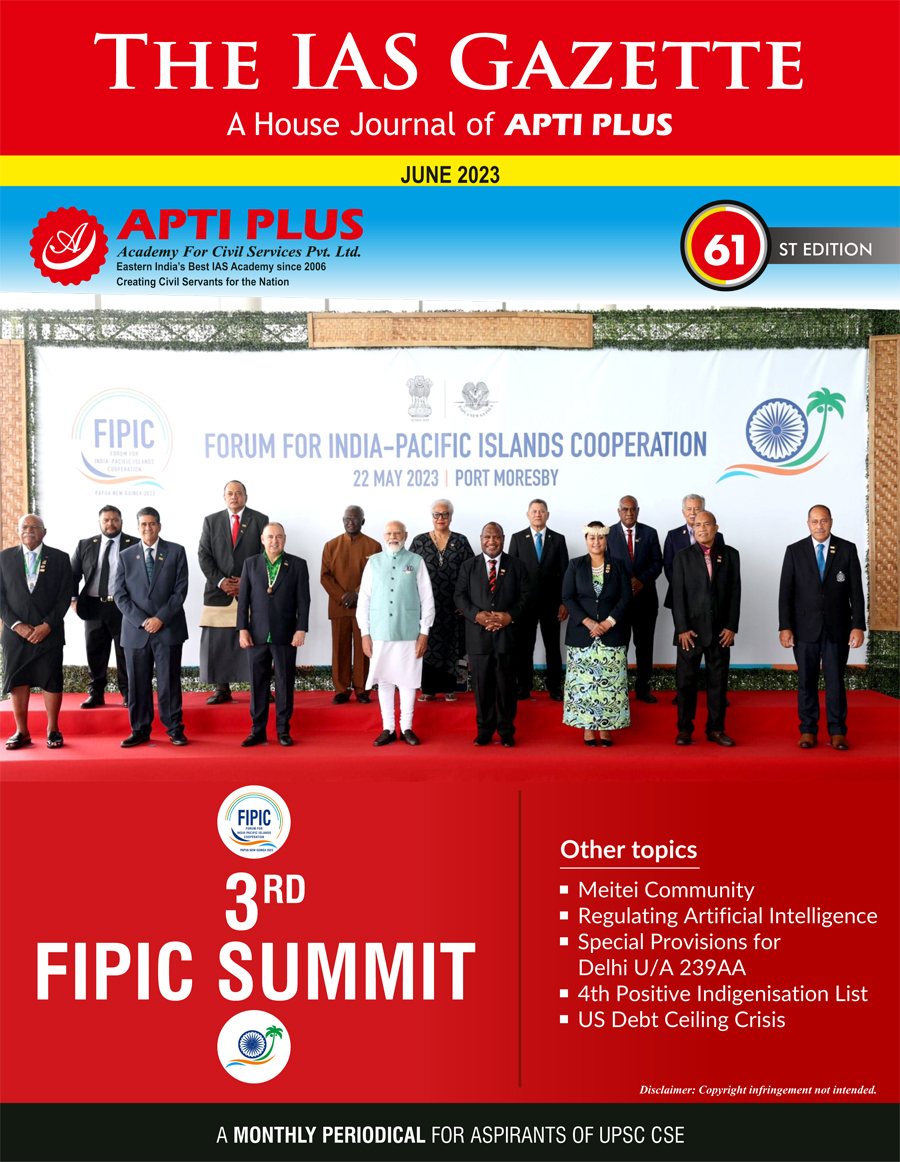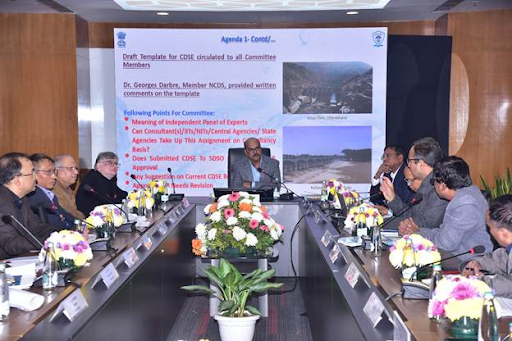
Disclaimer: Copyright infringement not intended.
Context
The issue of urban flooding in India
Details
- The recent deluge in North and North-Western India, including Delhi, caused by the Yamuna River overflowing.
- Residents were evacuated from low-lying areas due to waterlogging.
Urbanization and Its Impact on Water Systems
- India has witnessed numerous cycles of urbanization and de-urbanization since the Harappan era.
- The current phase of rapid urbanization will lead to a majority urban population within a decade or two.
Encroachment on Water Bodies and Drainage Systems
- Haphazard urbanization and construction activities led to encroachment over river floodplains, lakes, ponds, and wetlands.
- The inadequate drainage systems are incapable of handling heavy rainfall.
- The sanctity of lakes, waterbodies, and stormwater drains are disregarded in urban planning.
Importance of Master Plans in Urban Development
- Amitabh Kant's has emphasized on the need for a strategic urban planning document, the master plan.
- The master plan guides sustainable development of a city across zones, vertically and horizontally.
Comprehensive Approach to Mitigate Urban Flooding
- There is a need for better urban planning, infrastructure, sustainable drainage systems, and maintenance practices.
- A number of steps are required to flood-proof Indian cities, including preserving water bodies, improving drainage networks, and desilting rivers.
- Investment is required in flood-resistant infrastructure and simulation capabilities to identify flooding hotspots and flood risk maps.
Role of Data-Driven Policy Formulation
- There is growing importance of data in planning and infrastructure sectors, including GIS technology.
- Geographic Information System (GIS) can be used for city mapping and analysis.
- Spatial query and mapping functions can be used to assess the current state of the city and identify environmental conflicts.
Urban Planning for Sustainable Development
- India's urban population is projected to double in the next 25 years.
- The role of sustainable urban planning is critical in meeting development goals and urbanization demands.
- The recent floods in North India stand as a reminder to prioritize effective urban policy, governance, and technology.

Other Challenges with Urbanisation
Overcrowding and Congestion
- Rapid urbanization leads to an influx of people into cities, causing overcrowding and congestion in urban areas.
- Insufficient housing and infrastructure to accommodate the growing population result in slums and informal settlements.
Inadequate Infrastructure
- Urban infrastructure struggles to keep pace with the rapid growth of cities.
- Lack of proper roads, public transportation, water supply, and sanitation facilities pose significant challenges.
Urban Poverty and Inequality
- Urbanization often exacerbates income disparities and leads to the concentration of poverty in certain areas.
- Limited access to education, healthcare, and basic services for the urban poor.
Environmental Degradation
- Unplanned urbanization contributes to environmental degradation, including air and water pollution.
- Deforestation, loss of green spaces, and destruction of natural habitats due to urban expansion.
Pressure on Resources
- Increased demand for resources like water, energy, and land strains existing capacities.
- Inefficient use of resources and wasteful practices further exacerbate the problem.
Unemployment and Informal Sector
- Rapid urbanization often fails to create enough formal employment opportunities.
- Large portions of the urban population remain engaged in the informal sector, leading to job insecurity and low wages.
Traffic Congestion and Air Pollution
- Rising vehicle ownership and inadequate public transportation result in severe traffic congestion.
- Air pollution levels soar due to vehicular emissions and industrial activities, impacting public health.
Inadequate Waste Management
- The generation of enormous amounts of waste overwhelms existing waste management systems.
- Improper disposal of waste contributes to environmental pollution and health hazards.
Strain on Civic Services
- Overburdened civic services struggle to cope with the demands of a growing urban population.
- Inadequate garbage collection, sanitation, and healthcare facilities become prevalent.
Urban Heat Island Effect
- Concentration of buildings and concrete surfaces raises temperatures, leading to the urban heat island effect.
- Increased energy consumption for cooling exacerbates climate change challenges.
Land Use and Encroachment
- Unplanned expansion leads to encroachment on agricultural land and ecologically sensitive areas.
- Converting green spaces into concrete jungles affects biodiversity and natural ecosystems.
Informal Settlements and Slums
- Lack of affordable housing results in the proliferation of informal settlements and slums.
- These areas face inadequate infrastructure, sanitation, and access to basic services.
Water Scarcity
- Rapid urbanization strains water resources, leading to water scarcity in cities.
- Over extraction, pollution, and inefficient use of water aggravate the problem.
Social Tensions and Security Challenges
- Urbanization can lead to social tensions and conflicts arising from diverse communities coexisting in close proximity.
- Crime rates may increase due to the challenges of policing large urban areas effectively.
Vulnerability to Disasters
- Urban areas become more vulnerable to natural disasters like floods, cyclones, and earthquakes due to inadequate planning.
- Climate change effects exacerbate the risk of disasters.
Governance and Institutional Challenges
- Weak urban governance and institutional capacities hinder effective urban planning and development.
- Lack of coordination between different government bodies results in fragmented development.
Cultural Identity and Heritage Preservation
- Unplanned urbanization may threaten the preservation of cultural heritage and historic sites.
- Balancing modern development with the conservation of cultural identity becomes a challenge.
Financial Strain on Local Governments
- Rapid urbanization requires significant financial investments in infrastructure and services.
- Local governments often struggle to generate enough revenue to meet the growing demands.
Education and Skill Gap
- Urbanization may lead to a mismatch between the skills demanded by the job market and the education provided.
- Lack of proper training and education programs further widens the skill gap.
Mental Health and Well-being
- Urban life and the challenges it brings can impact mental health and well-being.
- Stress, anxiety, and loneliness become common issues in densely populated cities.

Measures to Tackle Urbanization
Integrated Urban Planning
- Develop and implement comprehensive master plans that guide sustainable urban development.
- Integrate land-use planning, transportation, housing, and infrastructure development to create well-designed, livable cities.
Strengthening Infrastructure
- Invest in robust and efficient infrastructure, including roads, public transportation, water supply, and sanitation facilities.
- Upgrade and expand existing systems to meet the needs of the growing urban population.
Affordable Housing and Slum Redevelopment
- Promote affordable housing projects to address the housing needs of low-income urban residents.
- Implement slum redevelopment programs to improve living conditions and provide better housing options.
Sustainable Urban Design
- Encourage green building practices and sustainable urban design principles to reduce environmental impacts.
- Preserve and enhance green spaces, parks, and recreational areas to improve the urban environment.
Smart City Initiatives
- Embrace technology and data-driven solutions to enhance urban services and governance.
- Implement smart city initiatives to improve efficiency, sustainability, and quality of life in urban areas.
Public-Private Partnerships (PPPs)
- Foster partnerships between government agencies and private sectors to finance and execute urban development projects.
- PPPs can leverage expertise and resources from both sectors to tackle urban challenges effectively.
Focus on Employment Generation
- Encourage the growth of industries and sectors that can create formal employment opportunities in urban areas.
- Support entrepreneurship and skill development programs to empower the urban workforce.
Efficient Waste Management
- Implement effective waste management systems to handle the increasing urban waste generation.
- Promote waste segregation, recycling, and waste-to-energy initiatives to minimize environmental impact.
Water Resource Management
- Adopt sustainable water management practices to conserve and optimize water resources.
- Implement rainwater harvesting and water recycling systems to alleviate water scarcity.
Disaster Preparedness and Resilience
- Develop and implement disaster management plans to address the vulnerability of urban areas to natural disasters.
- Improve resilience to climate change effects through climate-sensitive urban planning.
Decentralization of Urban Development
- Promote the growth of smaller cities and towns to reduce the burden on megacities.
- Decentralization can help distribute economic opportunities and ease the strain on resources in major urban centers.
Strengthening Local Governance
- Empower local governments with the necessary resources and decision-making authority.
- Enhance the capacity of local authorities to manage urban development effectively.
Promotion of Green Transport
- Encourage the use of eco-friendly transportation options such as cycling, walking, and public transport.
- Implement policies to reduce vehicular emissions and promote electric mobility.
Citizen Participation and Engagement
- Involve citizens in the urban planning process through public consultations and participatory decision-making.
- Engage communities in local development initiatives and foster a sense of ownership in urban improvements.
Research and Data-Driven Policy
- Invest in research and data collection to understand urbanization trends and challenges.
- Use data-driven insights to formulate effective urban policies and development strategies.
Capacity Building and Training
- Enhance the capacity of urban planning professionals and government officials through training and skill development programs.
- Ensure that those involved in urban development are equipped with the knowledge and expertise to address challenges effectively.
Encouraging Green Industries
- Promote the growth of eco-friendly and sustainable industries in urban areas.
- Green industries can create employment opportunities while minimizing environmental impacts.
Inclusive Urban Development
- Ensure that urban development benefits all sections of society, including vulnerable and marginalized communities.
- Address social inequalities through inclusive policies and targeted interventions.
Long-term Vision and Commitment
- Adopt a long-term vision for urban development and commit to its implementation.
- Political will and sustained efforts are essential to tackle the challenges of urbanization effectively.
|
PRACTICE QUESTION
Q) How can data-driven policy formulation and the use of technology, such as Geographic Information System (GIS), aid in mitigating the impacts of urban flooding? (150 words)
|
https://www.downtoearth.org.in/news/urbanisation/urbanisation-in-india-we-must-reimagine-how-our-cities-are-planned-90718










